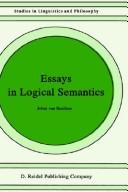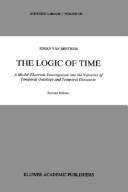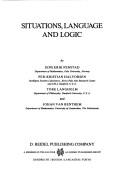| Listing 1 - 9 of 9 |
Sort by
|
Book
ISBN: 9027714215 9401098700 9401098689 9789027714213 Year: 1983 Volume: 156 Publisher: Dordrecht: Reidel,
Abstract | Keywords | Export | Availability | Bookmark
 Loading...
Loading...Choose an application
- Reference Manager
- EndNote
- RefWorks (Direct export to RefWorks)
Mathematical logic --- Time --- Ontology --- Tense (Grammar) --- Tense (Logic) --- Hours (Time) --- Geodetic astronomy --- Nautical astronomy --- Horology --- Logic, Tense --- Grammar, Comparative and general --- Logic --- Being --- Philosophy --- Metaphysics --- Necessity (Philosophy) --- Substance (Philosophy) --- Tense --- Ontology. --- Tense (Logic). --- Time. --- Tense (Grammar). --- Ontologie --- Temps (philosophie)

ISBN: 9027720924 9027720916 940094540X 9789027720924 Year: 1986 Volume: 29 Publisher: [Lieu de publication inconnu]: Reidel,
Abstract | Keywords | Export | Availability | Bookmark
 Loading...
Loading...Choose an application
- Reference Manager
- EndNote
- RefWorks (Direct export to RefWorks)
Lexicology. Semantics --- Philosophy of language --- Semantics --- Semantics (Philosophy) --- Sémantique --- Sémantique (Philosophie) --- Semantics. --- 800.92 --- 801.56 --- Intension (Philosophy) --- Logical semantics --- Semantics (Logic) --- Semeiotics --- Significs --- Syntactics --- Unified science --- Language and languages --- Logic, Symbolic and mathematical --- Logical positivism --- Meaning (Psychology) --- Philosophy, Modern --- Semiotics --- Signs and symbols --- Symbolism --- Analysis (Philosophy) --- Definition (Philosophy) --- Formal semantics --- Semasiology --- Semiology (Semantics) --- Comparative linguistics --- Information theory --- Lexicology --- Informatietalen. Formele talen --- Syntaxis. Semantiek --- 801.56 Syntaxis. Semantiek --- 800.92 Informatietalen. Formele talen --- Semantics (Philosophy). --- Sémantique --- Sémantique (Philosophie) --- Semantiek [Wijsbegeerte]. --- Sémantique [Philosophie]. --- Semantiek.

ISBN: 0792310810 904814082X 9401579474 9780792310815 Year: 1991 Volume: 156 Publisher: Dordrecht: Kluwer,
Abstract | Keywords | Export | Availability | Bookmark
 Loading...
Loading...Choose an application
- Reference Manager
- EndNote
- RefWorks (Direct export to RefWorks)
Ontology --- Grammar, Comparative and general --- Tense (Logic) --- Time --- Ontologie --- Temps (Linguistique) --- Temps (Logique) --- Temps --- Tense --- Time. --- Ontology. --- Tense (Grammar)
Book
ISBN: 1575860597 1575860589 9781575860589 Year: 1996 Publisher: Stanford (Calif.): CSLI,
Abstract | Keywords | Export | Availability | Bookmark
 Loading...
Loading...Choose an application
- Reference Manager
- EndNote
- RefWorks (Direct export to RefWorks)
Logic. --- Logique --- Logic --- Information, Théorie de l' --- Langage et logique --- Logique mathématique --- Information, Théorie de l' --- Logique mathématique
Book
Year: 2009 Publisher: Dordrecht: Springer,
Abstract | Keywords | Export | Availability | Bookmark
 Loading...
Loading...Choose an application
- Reference Manager
- EndNote
- RefWorks (Direct export to RefWorks)
Book
ISBN: 9780444517265 044451726X 9780080930848 0080930840 1282285858 9781282285859 9786612285851 6612285850 Year: 2008 Volume: 8 Publisher: Amsterdam: North-Holland,
Abstract | Keywords | Export | Availability | Bookmark
 Loading...
Loading...Choose an application
- Reference Manager
- EndNote
- RefWorks (Direct export to RefWorks)
Information is a recognized fundamental notion across the sciences and humanities, which is crucial to understanding physical computation, communication, and human cognition. The Philosophy of Information brings together the most important perspectives on information. It includes major technical approaches, while also setting out the historical backgrounds of information as well as its contemporary role in many academic fields. Also, special unifying topics are high-lighted that play across many fields, while we also aim at identifying relevant themes for philosophical reflection. There is no established area yet of Philosophy of Information, and this Handbook can help shape one, making sure it is well grounded in scientific expertise. As a side benefit, a book like this can facilitate contacts and collaboration among diverse academic milieus sharing a common interest in information.
Theory of knowledge --- Philosophy of science --- Information theory --- Philosophy. --- Philosophy --- Mental philosophy --- Humanities --- Communication theory --- Communication --- Cybernetics --- Information theory - Philosophy
Book
Year: 2009 Publisher: Dordrecht: Springer,
Abstract | Keywords | Export | Availability | Bookmark
 Loading...
Loading...Choose an application
- Reference Manager
- EndNote
- RefWorks (Direct export to RefWorks)

ISBN: 1556080484 9781556080487 Year: 1987 Volume: 34 Publisher: [Lieu de publication inconnu]: Reidel,
Abstract | Keywords | Export | Availability | Bookmark
 Loading...
Loading...Choose an application
- Reference Manager
- EndNote
- RefWorks (Direct export to RefWorks)
Logic --- Content (Linguistics) --- Semantics --- Contenu (Linguistique) --- Sémantique --- Formal semantics --- Semasiology --- Semiology (Semantics) --- Comparative linguistics --- Information theory --- Language and languages --- Lexicology --- Meaning (Psychology) --- Sémantique --- Semantiek --- Contenu [Linguistique]. --- Inhoud [Taalwetenschap].
Book
ISBN: 093707330X 0937073296 9780937073292 9780937073308 Year: 1988 Volume: 1 Publisher: Stanford (C.A.): Center for the study of language and information,
Abstract | Keywords | Export | Availability | Bookmark
 Loading...
Loading...Choose an application
- Reference Manager
- EndNote
- RefWorks (Direct export to RefWorks)
Intensional logic, as understood here, is based on the broad presupposition that so-called "intensional contexts" in natural language can be explained semantically by the idea of multiple reference. The text reviews tense, modality, and conditionals, then presents developments in intensional theory, including partiality and generalized quantifiers.
Logic --- Logique --- Logic. --- Argumentation --- Deduction (Logic) --- Deductive logic --- Dialectic (Logic) --- Logic, Deductive --- Intellect --- Philosophy --- Psychology --- Science --- Reasoning --- Thought and thinking --- Methodology
| Listing 1 - 9 of 9 |
Sort by
|

 Search
Search Feedback
Feedback About UniCat
About UniCat  Help
Help News
News